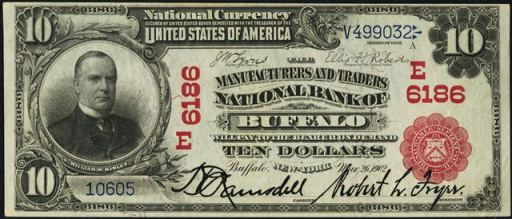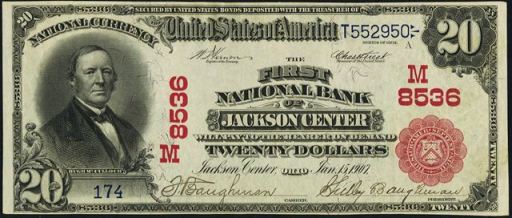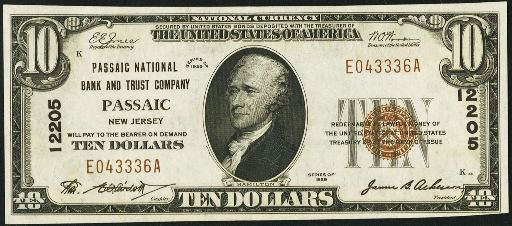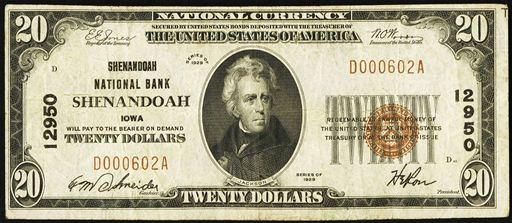The First National Bank Of Greenup
The First National Bank Of Greenup in Kentucky printed $402,410 dollars worth of national currency. That is a pretty standard output. However, some types of currency from this bank could still be rare. This national bank opened in 1903 and stopped printing money in 1934, which equals a 32 year printing period. That is a fairly normal lifespan for a national bank. During its life, The First National Bank Of Greenup issued 6 different types and denominations of national currency. We have examples of the types listed below. Your bank note should look similar. Just the bank name will be different. For the record, The First National Bank Of Greenup was located in Greenup County. It was assigned charter number 7037.
We buy all national currency. Please call or email us for a quote. Sales@AntiqueMoney.com
The First National Bank Of Greenup in Kentucky issued 930 sheets of $10 1902 red seal national bank notes. All red seals are very rare. But that sheet output is extremely low. We would love to see a picture of what you have. Collectors love ten dollar 1902 red seals. They usually represent the rarest bank notes printed by any national bank. Don’t let the term “series of 1902” confuse you. These were actually printed for about six years between 1902 and 1908. That is obviously a very short issue period which means that many red seals are quite rare. Each note has a portrait of William McKinley. Be sure to check the number under McKinley. If it is #1 then you are dealing with a note from the first sheet of bank notes issued. Number one bank notes are worth even more money than the already rare red seals.
1902 $10 Red Seal National Bank Note
The First National Bank Of Greenup printed 930 sheets of $20 1902 red seal national bank notes. Twenty dollar red seal bank notes have poor survival rates. They don’t command premiums compared to the ten dollar denomination, but they are definitely rarer. All 1902 red seals were printed on four note sheets. There were three ten dollar bills and one twenty dollar bill per sheet. The 1902 $20 notes have a portrait of Hugh McCulloch on them. The charter number and seal are both printed in red ink. The serial numbers have a slight blue tint to them. The charter number is printed around the border of the note several times. The bank’s title is right in the middle of the note and the state of issue is printed just below the title. Remember that all national bank notes are valued based on their condition and rarity. The same rule applies to 1902 $20 red seals.
1902 $20 Red Seal National Bank Note
The First National Bank Of Greenup also printed 5,647 sheets of Type1 1929 $10 national bank notes. Sadly, based on a number that high, there is basically no chance for these notes to be especially rare. Each $10 bill from 1929 has a portrait of Alexander Hamilton on it. The black number written vertically is the charter number. The charter number never affects the value; it is just an identifier. The ten dollar type1 national bank note happens to be the single most common national bank note, with over 65,000 known to exist from all banks. Of course each note is valued based on its condition and rarity. Some are very rare.
Series of 1929 Type1 $10 National Bank Note
The First National Bank Of Greenup also printed 5,647 sheets of Type1 1929 $20 national bank notes. Sadly, based on a number that high, there is basically no chance for these notes to be especially rare. Andrew Jackson is featured on the front of each 1929 $20 bill. Be sure to take note of the serial number on your specific bank note. If it is 000001 then you can expect a nice premium. There is a special market for serial number one bank notes. Of course, even if the number isn’t #1, it could still be collectible and have a high value just based on its condition and rarity alone.
Series of 1929 Type1 $20 National Bank Note
The First National Bank Of Greenup also printed 826 sheets of Type1 1929 $10 national bank notes. This is a small print range, but it does not guarantee rarity. Each $10 bill from 1929 has a portrait of Alexander Hamilton on it. The black number written vertically is the charter number. The charter number never affects the value; it is just an identifier. The ten dollar type1 national bank note happens to be the single most common national bank note, with over 65,000 known to exist from all banks. Of course each note is valued based on its condition and rarity. Some are very rare.
Series of 1929 Type1 $10 National Bank Note
The First National Bank Of Greenup also printed 200 sheets of Type1 1929 $20 national bank notes. That may sound like a very small number, and it is. However, when it comes to small size notes, that print range usually allows for a handful of survivors. Andrew Jackson is featured on the front of each 1929 $20 bill. Be sure to take note of the serial number on your specific bank note. If it is 000001 then you can expect a nice premium. There is a special market for serial number one bank notes. Of course, even if the number isn’t #1, it could still be collectible and have a high value just based on its condition and rarity alone.
Series of 1929 Type1 $20 National Bank Note



